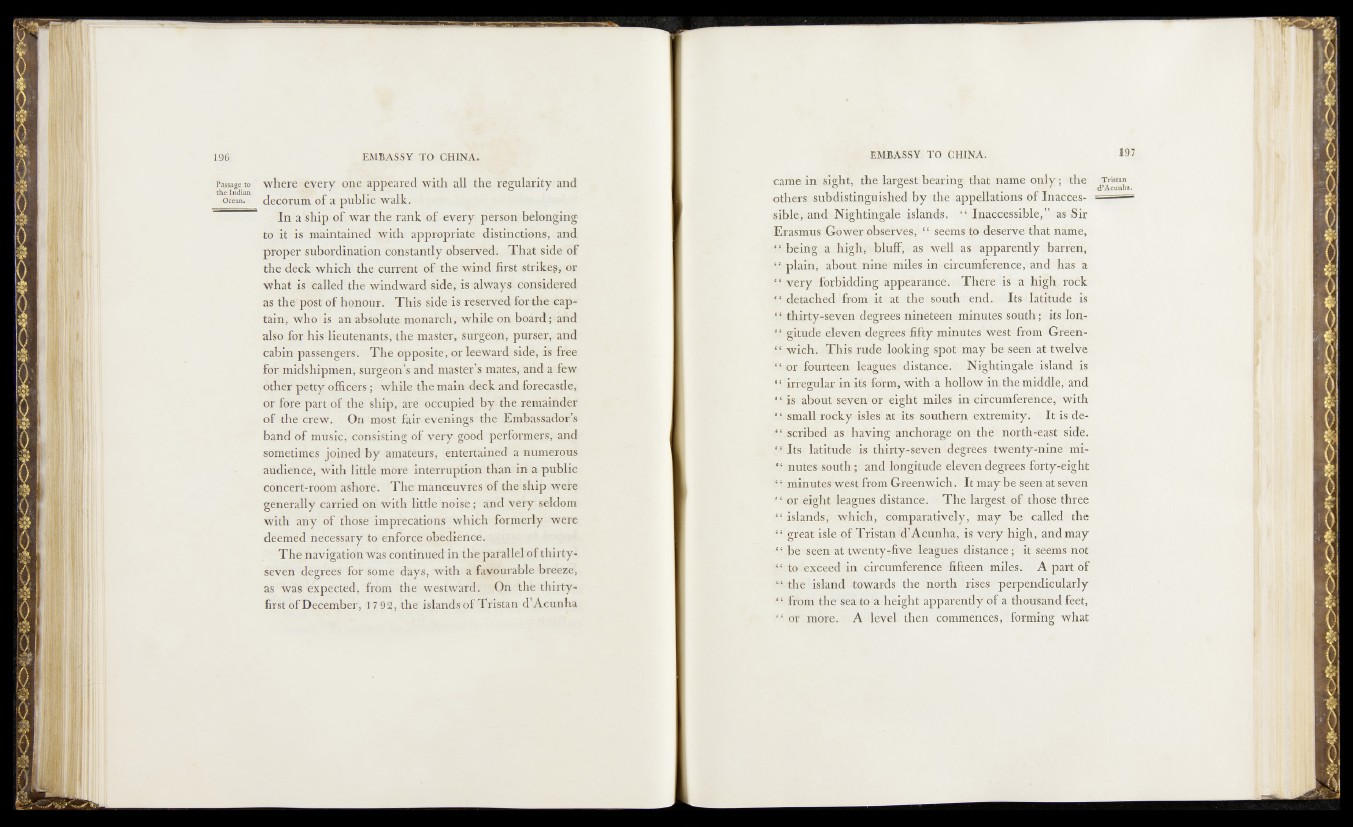
Passage to where ©very oije. appeared with all the regularity and
Ocean, decorum of a public walk.
In a ship of war the rank of every person belonging
to it is maintained with appropriate distinctions, • and
proper, subordination Constantly observed. That sid©6£
the deck which; the current of the wind first strikes, or
what is failed the windward side, is-always considered
as the'post of honour. This side is- reserved, for the captain,
who’is an absolute monarch, while on board ; 1 and
also for hislieiitenants, the master, surgeon, purser, and
cabin passengers^; The opposite, or leeward:..side, is free
for midshipmen, surgeon's and master’s mates, and a few
other petty officers; while the main deck and foreeat&lej
or fore part of the ship,; are occupied by. the. remainder
of the'drevl. On most fain^v^Mings th© EmhassaftorTo
band of musing consisting of very good performers, and
sometimes joined by amateurs, ^entertained’a numerous
audience, with-little more interruption than in a puMio
cdncerf-room ashore. The manoeuvres of the ship wefe
generally carried on with little noise; and very: seldom
with any of thbse imprecations which formerly were
" deemed nebe «sary* to enforce obedience. £ |
The navigation was continued in the parallel of thirty-
seven degrees'^p^/Sdme^ days, with a favourable breeze],
as was^expelCte#, from the wesiwardt1 ''On ®the thirty«
first of December, 17 92, the islands of Tristan d’Aeunha
came in sight, the-lhrgekdb.earingi that name only; the
oth^a^bdistingliipeftby tthfeiappellatiohs ©fTUabde's-1
sible, and Nightingale- islands. ‘ ‘ djiaiseessibie,’k'asiSir
Erasmus^Go weitlpbs-ei'ves, - i t?seems|||*d^eiv©'5(3iai Mite,
h being; a highyitalufF;; ? as cw-ell -as .apparently • barren,
-YKpIaih, . about’rdneimiitesdnJekem*fij€erence, ahd has 'a
“ .very forbidding appearance.« There is a high- rock
•‘si detached I ffiomlat fiat .thetsouA^end^d-ItS|latitude ifc
“ thirty7sey,en<.d^irees nineteen^mimatesssouth ;r<itS-’lofi-
V ‘gitude .eleven degrees -fifty .minutes? vses tifrom >-G'reen-
“ wich. This qrndeulooking spot may b,eys‘eefflt at twelt'e
•hfebr fourteen) lea^^sjdistanbe.vhl^righti'Ugci^i'islanli ft
'tdirregulaitiin its fdrm,-«wjth a hollow i?n|the micldl'e^and
-*‘Iis« about-'-sevenior eight miles in tefecumforehce, with
‘ 1 small rodky islesiat its southern extremity* i ItUs'de-
Ascribed as having »anchorage on-’the nprfch«ea§©sStdd.
“ Its.' latitude.iis - thirty-seve-ntldn'grfces twenty-nine- ? mi-
-*? nuteS‘-south ;iiand longitude eleven degfbks Tdtiy^gfgh't
i‘‘ jminutes. west- from Greenwich t "It maybn's'^ifdtSeY^d.
“ iorieight leagues distance ,-vi Thedargest ||fl| thbsHy three
islands;- which; cbmparatively, may hedcfelleduthfe
6dgrefflg iSlepflTristan^d’Acunhal, iiswery <Mgh^'andma'y
J . ,be ffiedmat 'twentyrfive' leagues distance p-it se'Cms not
^Sitooexeeed-in circumference1 .^fifteen miles. ' A part 6'f
M the i island towards ‘tbd nbrthvxr^y perpendicularly
“ from the' sea to; a height apparently ofa thousand feet,
“ or more. A level then commences, forming what
Tristan
d’Acunba.